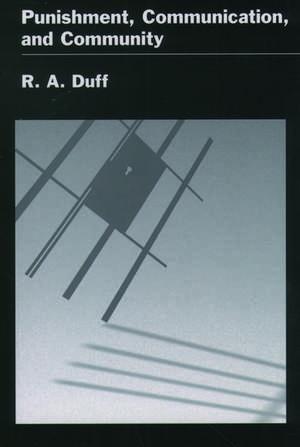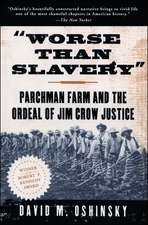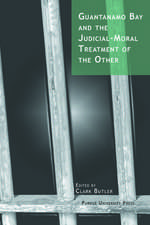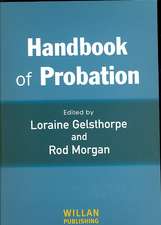Punishment, Communication, and Community
R. A. Duffen Limba Engleză Paperback – 29 mai 2003
Preț: 256.16 lei
Nou
Puncte Express: 384
Preț estimativ în valută:
49.02€ • 51.31$ • 40.80£
49.02€ • 51.31$ • 40.80£
Carte tipărită la comandă
Livrare economică 19-25 martie
Preluare comenzi: 021 569.72.76
Specificații
ISBN-13: 9780195166668
ISBN-10: 0195166663
Pagini: 272
Dimensiuni: 164 x 231 x 18 mm
Greutate: 0.39 kg
Ediția:Revised
Editura: Oxford University Press
Colecția OUP USA
Locul publicării:New York, United States
ISBN-10: 0195166663
Pagini: 272
Dimensiuni: 164 x 231 x 18 mm
Greutate: 0.39 kg
Ediția:Revised
Editura: Oxford University Press
Colecția OUP USA
Locul publicării:New York, United States
Recenzii
"R.A. Duff's "Punishment, Communication and Community" is a closely reasoned case for a distinctive normative justification of punishment based on mediation and probation."--The Law and Politics Book Review, August 2001
"Duff rejects the ultimate exclusionary penalty (capital punishment) for even the most dangerous of criminals and crimes; a reading of his reasons for doing so is a skillful journey through the relevant current literature."--Choice, October 2001
"Punishment, Communication, and Community is a masterful, comprehensive analysis of the justification of punishment in general and a landmark contribution to the communicative theory of state punishment that combines theoretical rigor, practical recommendations and humane common sense. Few will entirely agree with [the book], but all will be challenged. Duff's innovative work is required reading for criminal law theorists and policy makers."--Stephen J. Morse, University of Pennsylvania Law School
"In this masterly work, Professor Duff offers a penetrating assessment of recent work on penal philosophy and then develops his own communicative theory of punishment, which turns on ideas of community, penance and reconciliation. His account emphasizes the value of proportionate punishments designed to persuade offenders to face up to the implications of their crimes as public wrongs. Elegant in its philosophical argument and practical in its discussion of contemporary sentencing, this book sets the highest standards for work in this vital area of public policy at the start of a new millennium."--Andrew J. Ashworth, University of Oxford
"Antony Duff has in recent years established himself as one of our foremost philosophers of punishment, arguing for a communicative view of justified punishment that sees it as a form of secular penance . In this book, he offers his fullest account of this theory to date. His approach, if generally adopted, would require a transformation of many of our existing practices of state punishment. This is a deep and challenging volume: no-one who is seriously concerned with the nature of and justification for state punishment can afford to neglect its arguments."--Anthony Bottoms, Institute of Criminology, Cambridge University
"A compelling antidote and challenge to death penalty advocates who believe that the execution of Oklahoma City bomber Timothy McVeigh for killing 164 people will bring consolation to survivors and serve justice."--Choice
"This new book is a major contribution to our understanding of criminal justice and its contemporary politics. For every word in the book that gives succour to today's alarming trends in criminal justice policy, there are ten more that expose cant, ignorance, and confusion. For a philosophical work to engage so closely with current politics and practice without sacrificing philosophical quality is a rare achievement indeed." --John Gardner Punishment and Society
"Duff rejects the ultimate exclusionary penalty (capital punishment) for even the most dangerous of criminals and crimes; a reading of his reasons for doing so is a skillful journey through the relevant current literature."--Choice, October 2001
"Punishment, Communication, and Community is a masterful, comprehensive analysis of the justification of punishment in general and a landmark contribution to the communicative theory of state punishment that combines theoretical rigor, practical recommendations and humane common sense. Few will entirely agree with [the book], but all will be challenged. Duff's innovative work is required reading for criminal law theorists and policy makers."--Stephen J. Morse, University of Pennsylvania Law School
"In this masterly work, Professor Duff offers a penetrating assessment of recent work on penal philosophy and then develops his own communicative theory of punishment, which turns on ideas of community, penance and reconciliation. His account emphasizes the value of proportionate punishments designed to persuade offenders to face up to the implications of their crimes as public wrongs. Elegant in its philosophical argument and practical in its discussion of contemporary sentencing, this book sets the highest standards for work in this vital area of public policy at the start of a new millennium."--Andrew J. Ashworth, University of Oxford
"Antony Duff has in recent years established himself as one of our foremost philosophers of punishment, arguing for a communicative view of justified punishment that sees it as a form of secular penance . In this book, he offers his fullest account of this theory to date. His approach, if generally adopted, would require a transformation of many of our existing practices of state punishment. This is a deep and challenging volume: no-one who is seriously concerned with the nature of and justification for state punishment can afford to neglect its arguments."--Anthony Bottoms, Institute of Criminology, Cambridge University
"A compelling antidote and challenge to death penalty advocates who believe that the execution of Oklahoma City bomber Timothy McVeigh for killing 164 people will bring consolation to survivors and serve justice."--Choice
"This new book is a major contribution to our understanding of criminal justice and its contemporary politics. For every word in the book that gives succour to today's alarming trends in criminal justice policy, there are ten more that expose cant, ignorance, and confusion. For a philosophical work to engage so closely with current politics and practice without sacrificing philosophical quality is a rare achievement indeed." --John Gardner Punishment and Society













